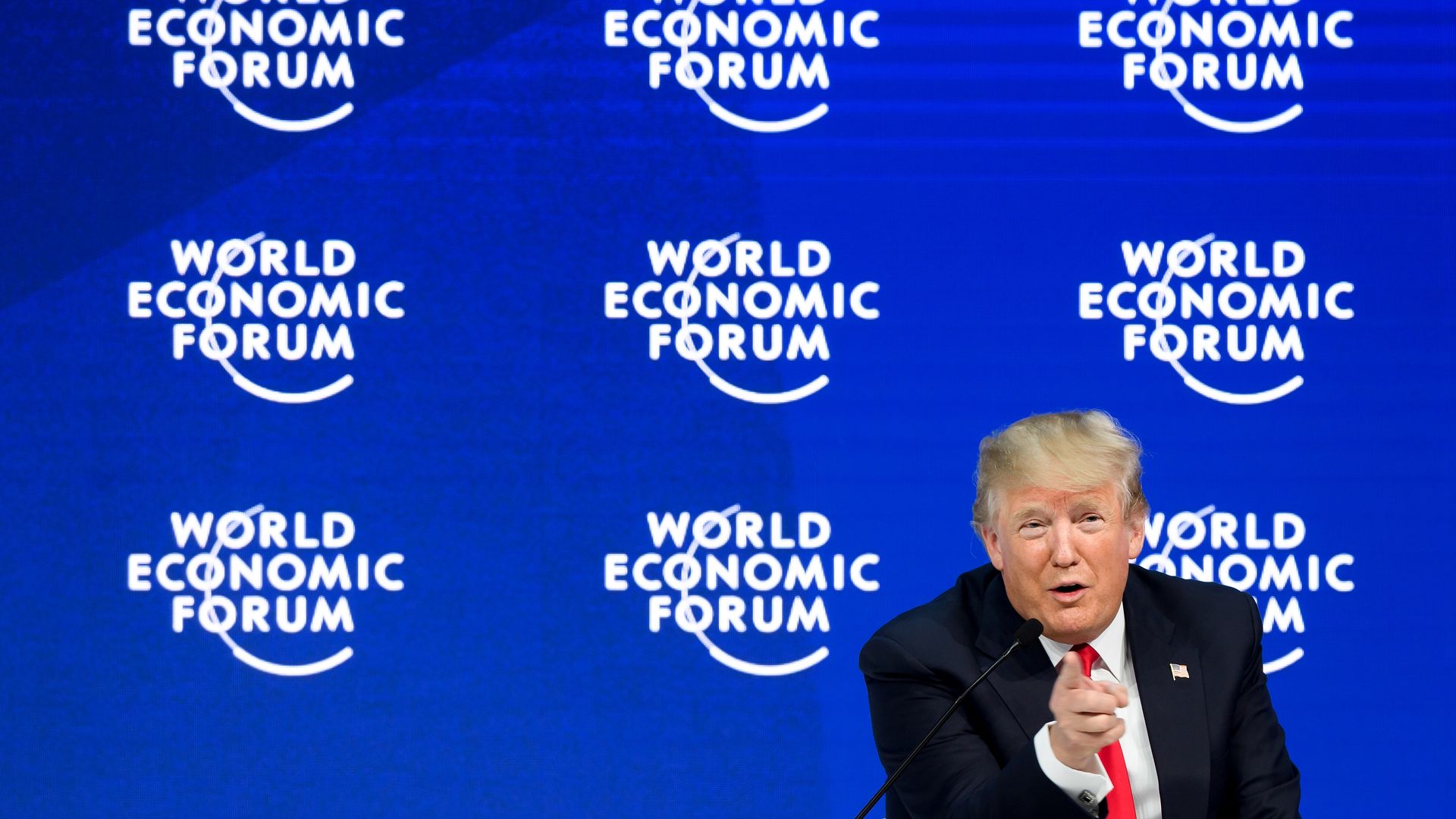
DAVOS — A parade of billionaires, CEOs, world leaders and hangers-on has now arrived in Davos, Switzerland, bearing skis, packed schedules and deep concerns about the global economy.
- PwC's annual Global CEO survey — 1,581 CEOs across 83 territories — was conducted in the fall and released tonight as the World Economic Forum opened. It makes for some pretty alarming reading.
The big picture: 53% of CEOs expect global economic growth to decline in 2020, up from 29% in 2019 and just 5% in 2018. Their views of their own companies’ prospects were the bleakest since 2009.
- That sentiment was spread across all regions, though CEOs in the Asia-Pacific are most optimistic and North American CEOs least so.
What they’re worried about:
- CEOs in the Asia-Pacific view trade conflicts as the top threat to their organizations’ bottom lines, while geopolitical uncertainty is the top concern in the Middle East, populism ranks first in Latin America, policy uncertainty in Africa and cyber threats in North America.
- Over-regulation is the biggest concern among CEOs in Europe, and also finishes top in the global average.
What they’re doing about it:
- Trade conflicts didn’t even register as a top 10 concern until last year, but are now top-of-mind, particularly in China.
- Chinese CEOs who are “extremely concerned” about trade conflicts are far more likely to say they’re shifting production to alternative territories than a year ago (44% then, 63% now).
- Among "extremely concerned" U.S. CEOs, 50% are adjusting supply chains but just 23% are moving production, while 34% aren't making any changes at all (compared to 5% in China).
- Worth noting: Chinese CEOs now list Australia, not the U.S., as the most important country for their growth prospects.
What they foresee:
- CEOs around the world expect massive changes for big tech. By 2022, most anticipate more regulations (71%), including on social media, the break-up of dominant firms (63%), and compensation of individual users for their data (51%).
- While companies are eager to stress their climate consciousness while in Davos, just 24% of CEOs are “extremely concerned” about climate change.
- In China, though, the percentage of CEOs who see new opportunities for their companies through climate change initiatives has jumped from 2% in 2010 to 47% now — far higher than in Germany (20%) or the U.S. (15%).
Who's coming to Davos
15,000 total attendees (3,000 of them with official invitations) including 100 billionaires and 53 heads of state or government, per Politico.
- Climate will dominate the official agenda. I eavesdropped on a few attendees tonight discussing whom they most wanted to see, and Greta Thunberg was the consensus pick. Soon after, placard-waving climate protesters chanted their way through the streets
- Several panels will also be dedicated to inequality and human rights.
Between the lines: The irony of the uber-rich and super-powerful arriving by private jet to discuss these topics in a proudly exclusive setting (there are at least 10 tiers of access badge) is lost on no one.
- But the sheer concentration of power and wealth in one Alpine town makes Davos, now in its 50th year, a hard-to-match destination for deal-making and consensus-building.
Trump in town
Davos opened this evening on the third anniversary of President Trump's inauguration, and on the eve of impeachment proceedings that will likely be watched more closely than his speech on Tuesday morning.
The big picture: Trump’s America First populism and climate skepticism are anathema to the Davos set, but his tax cuts and economic record are not.
- Two candidates who scare many CEOs more than Trump — Bernie Sanders and Elizabeth Warren — are among the top contenders in the Iowa caucuses, which begin two weeks from today.
- Kellyanne Conway told reporters ahead of Trump’s trip that he planned to “take on the perils of socialism right there in Davos,” while heralding his NAFTA replacement deal and partial trade agreement with China.
Trump's Davos dance card:
- European Commission President Ursula von der Leyen
- Pakistani Prime Minister Imran Khan
- Iraqi President Barham Salih
- Kurdistan Regional Government President Nechirvan Barzani
- Swiss President Simonetta Sommaruga
- World Economic Forum Founder Klaus Schwab
Also heading to Davos: Venezuelan opposition leader Juan Guaidó, who is defying a travel ban and may struggle to re-enter Venezuela.
https://news.google.com/__i/rss/rd/articles/CBMibWh0dHBzOi8vd3d3LmF4aW9zLmNvbS93b3JsZC1lY29ub21pYy1mb3J1bS1jZW8tc3VydmV5LWdsb2JhbC1ncm93dGgtMTk4YzQ1NWYtZTdkMS00YjFiLTliZmQtODIxNzIyNjMyNDYwLmh0bWzSAW1odHRwczovL2FtcC5heGlvcy5jb20vd29ybGQtZWNvbm9taWMtZm9ydW0tY2VvLXN1cnZleS1nbG9iYWwtZ3Jvd3RoLTE5OGM0NTVmLWU3ZDEtNGIxYi05YmZkLTgyMTcyMjYzMjQ2MC5odG1s?oc=5
2020-01-21 13:02:00Z
52780563469603
Bagikan Berita Ini














0 Response to "CEOs haven't been this pessimistic about the world economy since 2009 - Axios"
Post a Comment